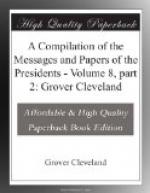The treaty commonly known as the Burlingame treaty conferred upon Chinese subjects the right of voluntary emigration to the United States for the purposes of curiosity or trade or as permanent residents, and was in all respects reciprocal as to citizens of the United States in China. It gave to the voluntary emigrant coming to the United States the right to travel there or to reside there, with all the privileges, immunities, or exemptions enjoyed by the citizens or subjects of the most favored nation.
Under the operation of this treaty it was found that the institutions of the United States and the character of its people and their means of obtaining a livelihood might be seriously affected by the unrestricted introduction of Chinese labor. Congress attempted to alleviate this condition by legislation, but the act which it passed proved to be in violation of our treaty obligations, and, being returned by the President with his objections, failed to become a law.
Diplomatic relief was then sought. A new treaty was concluded with China. Without abrogating the Burlingame treaty, it was agreed to modify it so far that the Government of the United States might regulate, limit, or suspend the coming of Chinese laborers to the United States or their residence therein, but that it should not absolutely prohibit them, and that the limitation or suspension should be reasonable and should apply only to Chinese who might go to the United States as laborers, other classes not being included in the limitations. This treaty is unilateral, not reciprocal. It is a concession from China to the United States in limitation of the rights which she was enjoying under the Burlingame treaty. It leaves us by our own act to determine when and how we will enforce those limitations. China may therefore fairly have a right to expect that in enforcing them we will take good care not to overstep the grant and take more than has been conceded to us.
It is but a year since this new treaty, under the operation of the Constitution, became part of the supreme law of the land, and the present act is the first attempt to exercise the more enlarged powers which it relinquishes to the United States.
In its first article the United States is empowered to decide whether the coming of Chinese laborers to the United States or their residence therein affects or threatens to affect our interests or to endanger good order, either within the whole country or in any part of it. The act recites that “in the opinion of the Government of the United States the coming of Chinese laborers to this country endangers the good order of certain localities thereof.” But the act itself is much broader than the recital. It acts upon residence as well as immigration, and its provisions are effective throughout the United States. I think it may fairly be accepted as an expression of the opinion of Congress that the coming of such laborers to the United States or their residence here affects our interests and endangers good order throughout the country. On this point I should feel it my duty to accept the views of Congress.




